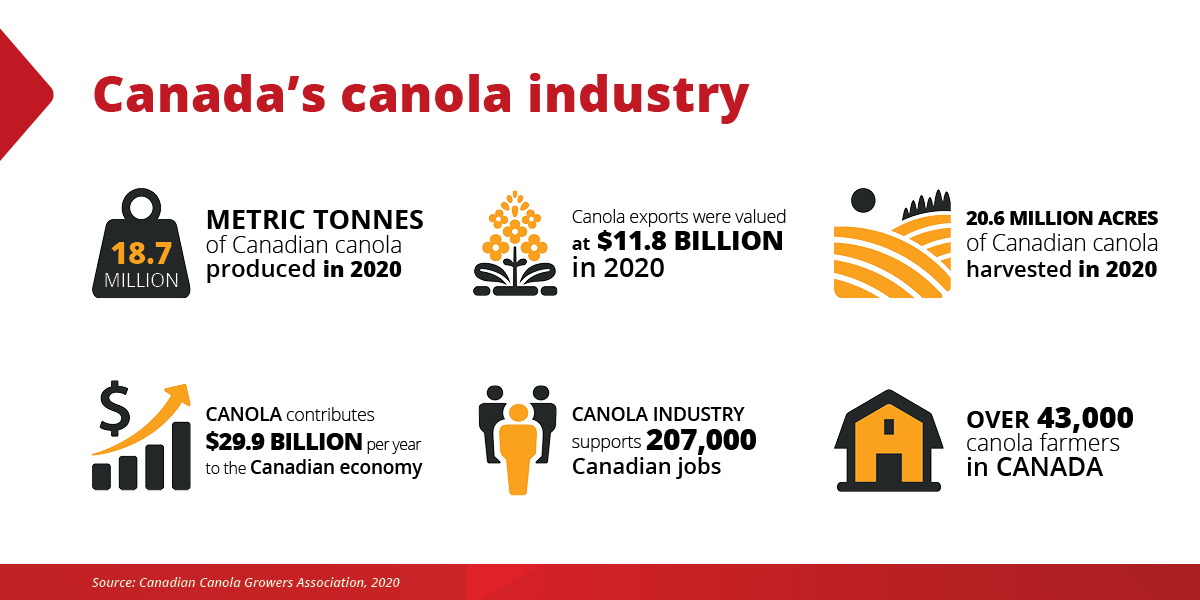Canola: the next big thing in renewable energy and plant-based protein
An evolution is afoot with canola crops in Canada. Once simply a source of oil, Canadian farmers and companies are now using canola in innovative ways to minimize environmental impact and contribute to a cleaner future. The first new development is oil, which is used to produce renewable biodiesel. Second, canola protein, which is being used as a plant-based protein for human consumption.
Canola is the world’s second-largest oilseed crop, behind soybeans. Canada’s Prairie provinces—Manitoba, Saskatchewan and Alberta—are the largest canola producers in the world and the crop is an important part of the regional economy. In Saskatchewan in particular, value-added agri-processing activities are increasing, with over $4 billion of investment announced in the first half of 2021. This aligns with SK’s Growth Plan to crush more than 75% of canola in the region.
Read on to learn why global companies are investing in Canadian canola.
Saskatchewan’s canola attracts major investments
In March 2021, investment activity started with Richardson announcing that it would double its current Yorkton, SK crushing facility to 2.2 million metric tonnes. Cargill unveiled it would open a state-of-the-art canola processing facility with an investment of approximately $350 million USD in April 2021 in Regina, SK. Later the same week, Viterra announced another canola crushing facility in Regina which is claimed to be the world’s largest canola crushing plant with an undisclosed investment amount. Not even a month later, Ceres Global Ag announced it would build a new $350 million USD canola crushing facility near Estevan, Saskatchewan.
In addition to large announcements from the major agri-food players in canola, Red Leaf Pulp Ltd. announced a new wheat straw pulp facility with an investment of approximately $350 million USD.
To capitalize on the massive opportunity for canola, Estevan-based Covenant energy is also planning to build a canola oil refinery to produce renewable diesel which will used in the sustainable aviation fuel (SAF) market.
Why invest in canola in Canada?
Why have these global companies chosen to invest in Canada? It begins with Canada’s canola industry being one of the largest in the world. Top notch quality, high production volumes and an established ecosystem of farmers, refiners and producers makes it an appealing investment destination.

Due to Canada’s natural advantages and established leadership in the industry, opportunity is emerging in new, innovative ways to use canola: renewable energy and plant-based protein.
Canola’s renewable energy potential
The Prairies are home to many feeds stock crops which could be used as biomass for renewable energy, thereby decreasing GHG emissions.
Using canola as a feedstock for biofuels signals strong farmer leadership in supporting Canada’s green economy, and will contribute to achieving Canada’s target to reach net zero emissions by 2050. If Canada had a 5% biofuel inclusion rate, the annual GHG emissions reductions would almost equal to removing 1 million cars off Canadian roads each year, due to canola’s lower carbon intensity rating compared to petroleum diesel. An off-grade canola seed that may not be sold into the food market could be used in biofuels, creating demand for a product that otherwise had limited opportunities.
Furthermore, diversifying international markets and reducing trade risk through domestic demand growth has been one of the key strategic areas for Canada’s agricultural sector. Currently, more than 90% of Canada's canola is exported as seed, oil and meal to approximately 50 countries around the world. Increasing the domestic demand for canola biofuel reduces the dependency of Canadian farmers on exports and exposure to international trade disruptions which arose during the COVID-19 pandemic. For instance, blending at 5% biodiesel in Canada could use 1.3 million+ tonnes of seed, a domestic market similar in scale to Japan.
Support programs and incentives at federal, provincial and municipal levels can be leveraged by investing in canola oil and biofuel production. For example:
- The Strategic Innovation Fund bolsters business investment by supporting R&D, firm expansion, large-scale investment projects and clean technology adoption and decarbonization.
- AgriInnovate helps companies de-risk their capital expenditures.
- The Scientific Research and Experimental Developmental (SR&ED) program provides income-tax credits and refunds for expenditures on eligible R&D activity in Canada.
- The National Trade Corridor Fund supports infrastructure projects in Canada, such as ports, railways, transportation facilities and access roads.
- The Global Skills Strategy can help companies to quickly access talent from abroad.
Canola as a Plant-Based Protein
Food producers and ingredient suppliers are consistently exploring innovative solutions to satisfy consumer demand as the plant-based protein market continues to grow at a significant pace. While there are many plant-based protein companies that are using soy or peas for protein, other options like canola are gaining momentum and making their way onto our tables.
In 2020, Merit Functional foods announced it would produce canola protein in partnership with Bunge. Protein Industries Canada (one of Canada’s five Superclusters) has also partnered in multiple projects to develop innovative products in the plant protein space and always open to collaborate with companies and institutions in transforming the food processing sector in Canada.
How Invest in Canada can help
Canada’s canola industry is ripe for investment. Already, major global companies are recognizing the opportunity that canola presents for renewable energy and plant-based proteins. Your company could be next!
Invest in Canada offers Virtual Site tours for investors interested in the Prairies. Using this robust tool, you can get an overview of opportunities and explore the agriculture ecosystem of the region, prior to travelling to Canada.
If you are interested in a virtual tour or would like to discuss your project, contact us to learn how you can be part of this great growth story happening in Canada.